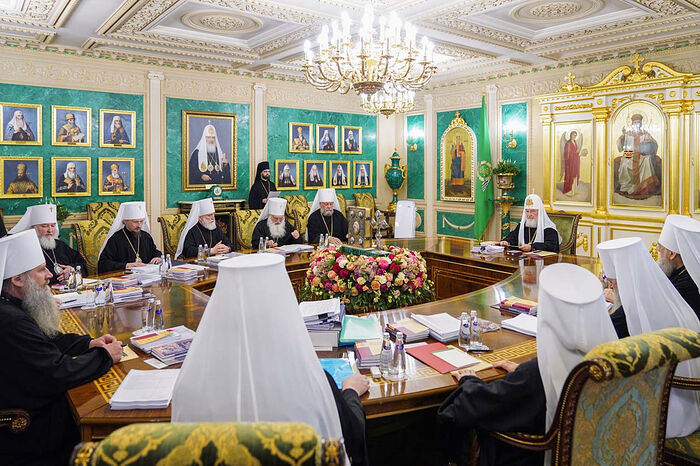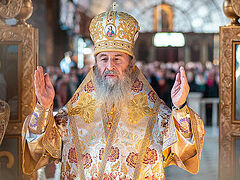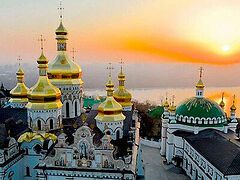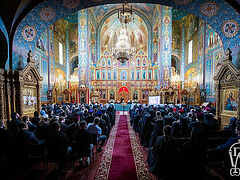Moscow, May 30, 2022
The Holy Synod of the Russian Orthodox Church held an extraordinary session yesterday to address the developments in the Ukrainian Orthodox Church, including the Council held in Kiev on Friday, and the cessation of the commemoration of the Patriarch of Moscow in the Divine services in Ukraine.
The Russian Synod reaffirmed the UOC’s independence and self-autonomy in its administration. It also “expressed regret” over the fact that His Holiness Patriarch Kirill is no longer liturgically commemorated in many dioceses of the UOC, but did not pronounce any condemnations.
Among other decisions, the Council of the UOC held on Friday expressed its disagreement with Patriarch Kirill’s position concerning the fratricidal war in Ukraine, and announced that a number of amendments and additions were made to the UOC statutes, “indicating the full autonomy and independence of the Ukrainian Orthodox Church.”
The Council resolutions proved to be somewhat ambiguous, as the right to “autonomy and independence” in its administration was granted to the UOC by His Holiness Patriarch Alexei II already in 1990.
However, according to Archpriest Nikolai Danilevich, Deputy Chairman of the UOC’s Department for External Church Relations, the changes to the statutes included removing any and all mention of any connection to the Russian Church. He stopped short of stating that the UOC is now autocephalous, commenting rather that, “In fact, in their content, the UOC statutes are now those of an autocephalous Church.”
On Saturday morning, Metropolitan Hilarion, the Chairman of the Russian Church’s Department for External Church Relations, published a video in which he interpreted the UOC Council resolutions as a “confirmation of the status that this Church has had since 1990… The unity between the Russian Orthodox Church and the Ukrainian Church is preserved and we will continue to strengthen this unity, we will continue to pray for our united holy Orthodox Church.”
In his Sunday homily, His Holiness Patriarch Kirill said:
We fully understand how the Ukrainian Orthodox Church is suffering today, we understand that His Beatitude Metropolitan Onuphry and the episcopate must act as wisely as possible today so as not to complicate the life of their faithful people. We are sympathetic to all this, but we also pray that no temporary, external obstacle will ever destroy the spiritual unity of our people.
Meanwhile, in Kiev, Met. Onuphry read the liturgical commemorations not according to the practice of the primate of an autonomous Church within a larger autocephalous Church, but according to the practice of the primates of the autocephalous Local Churches, who commemorate the other primates with whom they are in communion.
Thus, he commemorated Pat. Kirill not as the primate over him, but as a primate with whom he shares communion.
The Russian Holy Synod met later on Sunday to discuss the developments in Ukraine.
-
To express full support and understanding to the archpastors, pastors, monastics, and laity of the Ukrainian Orthodox Church, which is being subjected to unprecedented pressure from representatives of schismatic structures, local authorities, the media, extremist organizations, and the nationalist-minded part of the public.
-
To call the plenitude of the Russian Orthodox Church to fervent prayer for the strengthening of our brethren in Ukraine, for granting them courage and God’s help in the daily feat of Christian witness.
-
To state that the status of the Ukrainian Orthodox Church is determined by the Gramota of His Holiness Patriarch Alexei II of Moscow and All Russia dated October 27, 1990. [See the text of the Gramota below.]
-
To note that the additions and amendments to the Statutes on the administration of the Ukrainian Orthodox Church adopted by the Council of the Ukrainian Orthodox Church need to be studied in the prescribed manner for their compliance with the aforementioned Statutes and the Statutes of the Russian Orthodox Church, according to which such additions and amendments must be submitted for approval to the Patriarch Moscow and all Russia. [See the text of the relevant section of the Russian Church statutes below.]
-
To emphasize that Patriarch Kirill of Moscow and All Russia, deeply empathizing with all those affected by the tragedy, has repeatedly called to do everything possible to avoid civilian casualties, and for all members of the Russian Orthodox Church to pray fervently for the speedy restoration of peace and to provide all possible assistance to all those affected, including refugees, and people left without shelter and livelihood.
-
To express regret over the fact that in a number of dioceses of the Ukrainian Orthodox Church the commemoration of the Patriarch of Moscow and All Russia has been discontinued, which has already led to divisions within the Ukrainian Orthodox Church and which contradicts Canon 15 of the First-Second Council. [See the text and interpretation of the Canon below.]
-
To testify that the entirety of the Russian Orthodox Church prays for the preservation of Church unity and for the speedy cessation of bloodshed.
***
We, the humble Alexei II, by the grace of God, Patriarch of Moscow and All Russia, together with all the Right Reverend bishops of the Russian Orthodox Church-Moscow Patriarchate, gathered for the Bishops’ Council on October 25-27, 1990 at Danilov Monastery in the God-saved city of Moscow, guided by the desire to have blessed peace, the love of Christ, and fraternal unity in the common work in the field of God with the plenitude of the Ukrainian Orthodox Church, taking into account the desire and intercession of her Right Reverend archpastors, who gathered on July 9, 1990, in the God-saved city of Kiev to discuss and resolve their Church life on the basis of independence and autonomy, bless the Ukrainian Orthodox Church, through this Gramota, by the power of the All-Holy and Life-Giving Spirit, to henceforth be independent and autonomous in its governance, and you, unanimously elected on July 9, 1990, by the episcopate of the Ukrainian Orthodox Church, to be its primate.
We hope that the Ukrainian Orthodox Church will be governed according to the Divine and sacred Canons and the customs of the Orthodox Catholic Church inherited from the Holy Fathers and the definitions of this Bishops’ Council. With one heart and with one mouth, we pray to the Lord, our Chief Shepherd, for the Heavenly help and blessing of the holy Orthodox Ukrainian Church.
May the Ukrainian Orthodox Church, united through our Russian Orthodox Church with the One, Holy, Catholic, and Apostolic Church, not change anything about the dogmas of the faith and the holy canons without a conciliar decision of the entire plenitude of the Orthodox Catholic Church.
May the Beneficent and Almighty Life-Giving Trinity, the Father, Son and Holy Spirit, always strengthen the holy Orthodox Ukrainian Church, crown it with glory and honor, and bless its existence for the salvation of its pious plenitude.
***
Chapter 10 of the Statutes of the Russian Orthodox Church, concerning the Ukrainian Orthodox Church:
1. The Ukrainian Orthodox Church is self-governing with the rights of broad autonomy.
2. The Ukrainian Orthodox Church has been granted independence and autonomy in its administration in accordance with the Resolution of the Bishops’ Council of the Russian Orthodox Church on October 25-27, 1990, “On the Ukrainian Orthodox Church.”
3. In its life and activity, the Ukrainian Orthodox Church is guided by the Resolution of the 1990 Bishops’ Council of the Russian Orthodox Church, “On the Ukrainian Orthodox Church,” the 1990 Gramota of the Patriarch of Moscow and All Russia and the Statutes of the Ukrainian Orthodox Church, which are confirmed by its primate and approved by the Patriarch of Moscow and All Russia.
4. The organs of ecclesiastical authority and administration of the Ukrainian Orthodox Church are its Council and Synod, headed by its Primate, bearing the title "His Beatitude Metropolitan of Kiev and All Ukraine". The control center of the Ukrainian Orthodox Church is located in the city of Kiev.
5. The primate of the Ukrainian Orthodox Church is elected by the episcopate of the Ukrainian Orthodox Church and blessed by His Holiness the Patriarch of Moscow and All Russia.
6. The name of the primate is commemorated in all churches of the Ukrainian Orthodox Church after the name of the Patriarch of Moscow and All Russia.
7. The bishops of the Ukrainian Orthodox Church are elected by its Synod.
8. The decision on the formation or abolition of dioceses belonging to the Ukrainian Orthodox Church and on the determination of their territorial boundaries are made by its Synod with subsequent approval by the Bishops’ Council.
9. The bishops of the Ukrainian Orthodox Church are members of the Local and Bishops’ Councils [of the Russian Church] and participate in their work in accordance with Sections II and III of these Statutes and in meetings of the Holy Synod.
10. The decisions of the Local and Bishops’ Councils [of the Russian Church] are binding on the Ukrainian Orthodox Church.
11. The decisions of the [Russian] Holy Synod apply to the Ukrainian Orthodox Church, taking into account the peculiarities determined by the independent nature of its governance.
12. The Ukrainian Orthodox Church has its own supreme ecclesiastical court. At the same time, the court of the Bishops’ Council [of the Russian Church] is the ecclesiastical court of the highest instance for the Ukrainian Orthodox Church.
Within the limits of the Ukrainian Orthodox Church, such canonical prohibitions as a lifetime ban from the priesthood and defrocking are imposed by the diocesan bishop with subsequent approval by the Metropolitan of Kiev and All Ukraine and the Synod of the Ukrainian Orthodox Church.
13. The Ukrainian Orthodox Church receives holy Chrism from the Patriarch of Moscow and All Russia.
***
Canon 15 of the First-Second Council, held in Constantinople in 851:
The rules laid down with reference to Presbyters and Bishops and Metropolitans are still more applicable to Patriarchs. So that in case any Presbyter or Bishop or Metropolitan dares to secede or apostatize from the communion of his own Patriarch, and fails to mention the latter’s name in accordance with custom duly fixed and ordained, in the divine Mystagogy, but, before a conciliar verdict has been pronounced and has passed judgment against him, creates a schism, the holy Council has decreed that this person shall be held an alien to every priestly function if only he be convicted of having committed this transgression of the law. Accordingly, these rules have been sealed and ordained as respecting those persons who under the pretext of charges against their own presidents stand aloof, and create a schism, and disrupt the union of the Church. But as for those persons, on the other hand, who, on account of some heresy condemned by holy Councils, or Fathers, withdrawing themselves from communion with their president, who, that is to say, is preaching the heresy publicly, and teaching it barehead in church, such persons not only are not subject to any canonical penalty on account of their having walled themselves off from any and all communion with the one called a Bishop before any conciliar or synodal verdict has been rendered, but, on the contrary, they shall be deemed worthy to enjoy the honor which befits them among Orthodox Christians. For they have defied, not Bishops, but pseudo-bishops and pseudo-teachers; and they have not sundered the union of the Church with any schism, but, on the contrary, have been sedulous to rescue the Church from schisms and divisions.
Interpretation of the Canon, included in The Rudder of St. Nikodemos the Hagiorite:
The same rules as were prescribed in the above Canons with regard to bishops and Metropolitans, are prescribed, and so much the more so, by the present Canon with regard to Patriarchs. For it says that if any presbyter or bishop or Metropolitan should separate himself from the joint communion of his own Patriarch, and does not mention his name in accordance with custom (this applies, that is to say, to only the Metropolitan; for a presbyter mentions only the name of his bishop, and the bishop mentions only the name of his Metropolitan), before revealing the charges against their Patriarch to the Council, and before learning that he has been condemned by the Council — they, I say, shall all be completely deposed from office; the bishops and Metropolitans from every prelatic activity; the presbyters from every priestly activity. But these provisions are of effect if presbyters separate from their bishops, or bishops separate from their Metropolitans, or Metropolitans separate from their Patriarchs, on account of certain criminal charges, of fornication, say, of sacrilege, and of other serious crimes. If, however, the said presidents are heretics, and are preaching their heresy openly, and on this account those subject to them separate themselves, and even though it be before there has been any conciliar or synodal trial concerning the heresy, but are even deemed to deserve fitting honor as Orthodox Christians, since not only have they caused no schism in the Church on account of their separation, but have rather freed the Church from the schism and heresy of their pseudo-bishops. See also Ap. c. XXXI.
Follow OrthoChristian on Twitter, Vkontakte, Telegram, WhatsApp, MeWe, and Gab!





